- by TJ
I don’t like to toot my own trumpet, but “toot, toot”. Correctly predicting the elevation of Rod Petrie as new SFA President is hardly challenging. The antiquated four years in office rule makes it all but certain. When we created the “Roddy P – The Future is Safe Wi Me” mugs it was really a light jibe at a protocol so out of date and self-serving that it has no place in modern football. Best person for the job should get the job, not the one who has ridden the gravy train for the most jus. The elevation of Mike Mulraney to vice president gives a clear picture of what is coming next.
To be fair I think that Peter Lawwell deserves a bit of a trumpet tooting as well for correctly predicting both the CEO and vice-president back in February 2018.
“You have a board there with very capable people in Mike Mulraney, who represent the clubs, alongside Ian Maxwell. And you’ve got independent non-executives in Gary Hughes and Ana Stewart who are capable people.
“I think it’s time for these guys to be given their head and maybe given a bit more authority to actually understand what is the purpose of the SFA in the modern game? And how does that relate to the SPFL and the clubs?
– Peter Lawwell, Celtic CEO
Of course he’d have little to do with the major clubs finally getting a man in the CEO seat and his go-to man in the VP seat. Shortly after losing interest in pursuing Resolution 12. Like some sort of quid-pro-quo that would see a change in tune to “better to focus on Celtic now”.
The major clubs starting to get traction over the SFA might be seen as a welcome change over the myriad of small clubs that produced the ‘blazer’ culture. In reality its swapping one set of vested self-interests for another. The SFA needs to be representative of all stakeholders in Scottish football and that can’t happen while only clubs and their cartel leaders have a voting say. We’ve previously espoused a different model that would embrace a wider set of stakeholders and frankly the intrusion of real democracy into the Hampden mafia would be most welcome and introduce much needed accountability for performance. I do wonder whether if PL were to just say “look bhoys, we’re on to a good thing now at the SFA so don’t rock the boat” whether it would be more or less acceptable.
The Case for CAS
News also broke yesterday that the ongoing SFA charges relating to the UEFA licence grant in the 2011/12 season to Rangers may soon see some movement within the Hampden corridors.
“I would expect that to come back to the board in the not-too-distant future.
“It (going to CAS) is still under consideration.
“We’ll come back on that in due course. I wouldn’t want to put a timescale on it.
“But I don’t think we would let it go for ever.”
– Ian Maxwell, SFA Chief Executive
This is quite a nuanced issue. It’s not one we had forgotten about despite the sustained silence. We’d been regularly following up on it with the SFA just in case they let it drift.

The reason it needs to be heard is multi-faceted. Some will point out that it impacts on the perception of whether Rangers are or are not the same club as that which went bust in 2012. That isn’t a view that we share.
By now I’m sure most people in Scottish football will be familiar with the Five Way Agreement entered into by the SFA, SPL, SPFL, Rangers Oldco and Rangers Newco. There is also a ‘side-letter’ to this agreement that purports to indemnify Rangers Newco from much of the sins of the Oldco. The common perception is that this idemnification (which appears to be Neil Doncaster’s work) is the reason under which Rangers claimed a lack of jurisdiction of the SFA. It seems unlikely that this is the full story. I’m not aware of anyone outside the parties involved to hold a copy of the signed version of either the 5Way or its side-letter, so cannot vouch for the accuracy of either, but the documents at the foot of this article are generally considered to be indicative of the final versions. In the case of the side-letter it only appears to prevent the SPL from taking action against Rangers Newco, not the SFA. The Notice of Complaint in respect of the 2011/12 UEFA license was raised by the ex-SFA Compliance Officer Tony McGlennan after an 8 month investigation following revelations in the Craig Whyte trial.
Hopefully the attached below help to illustrate that the creditors of Rangers Oldco were tightly defined in the 5Way and did not allow for open ended liability to be imposed on the Newco. The agreement itself served the purpose of bridging the legal divide between the two companies (Oldco and Newco) in terms of the conditions under which the SFA would transfer the Oldco membership of the SFA and the league bodies would permit the Newco to operate a football team in their competitions. It is quite simply a contract that governs what privileges a new entity will be granted in exchange for accepting some liabilities of the old entity. Legally Newco could not be held responsible for liabilities of Oldco unless it agreed to take them on. This was the quid-pro-quo. In the case of any dispute over the agreement CAS clearly has jurisdiction.
Revenues generated by false representations made by an old board were not something that the Newco benefited from. Penalties (sporting or financial) resulting from any benefit Oldco gained would be a liability (or loss of earning if sporting) that did not form part of what they accepted in exchange for continuity of SFA membership and a place in the competitions. Rangers are therefore quite within their rights to challenge the SFA’s authority to raise a complaint against them.
More than this though, the fact is that the SFA were a party heavily involved in the approval of the UEFA licence that is at the centre of the dispute. The Newco is not, yet the SFA would seek to lay the blame at their door absolving themselves. Having seen the documentation relating to the licence application and grant it is clear that there is a case to answer relating both the the grant and the monitoring period which would have required notification to the SFA, but that making the case on the grantwould have most likely meant refusal of the licence while the monitoring period doesn’t. The Giannina case at CAS suggests it would have. There was also no agreement regarding payment of the assessment and the only possible appeal related to the interest and penalties rather than the assessment of tax at the time of the grant. There’s a debate to be had about timing of payment scheduling but too long and technical to post here. The more interesting part to me is around seeming misstatements in the accounts and misleading of the auditors that affect the decision in either interpretation.
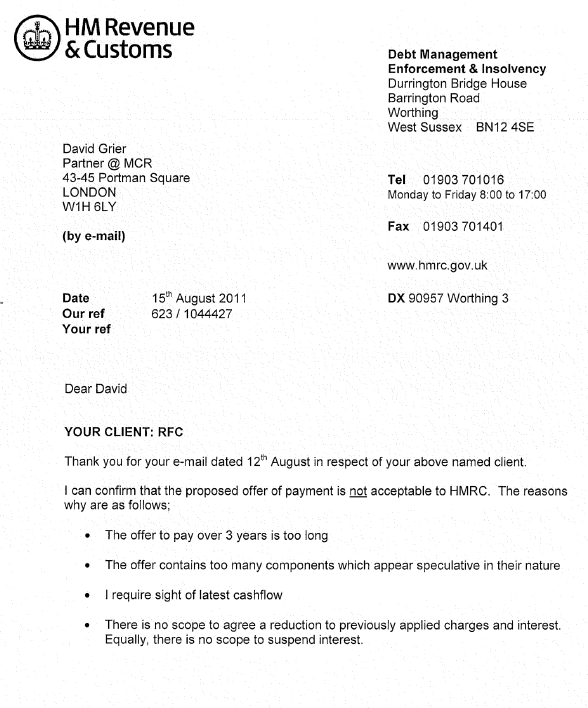
There are real question marks about the SFA’s role in the granting however and that is far more alarming on a continuing basis than the sins of a former Board at an entity no longer running a football club. Who could forget Stewart Regan’s infamous email on the subject which would have propulgated a falsehood had the statement been released as requested. It is also clear that the tax liability was part of an ongoing discussion with Ken Sharp at the SFA. How much was known and when is simply not clear though and deserves an answer rather than buried. Whether they were diligent in inquries and establishing the facts also is important. How was it allowed to happen?
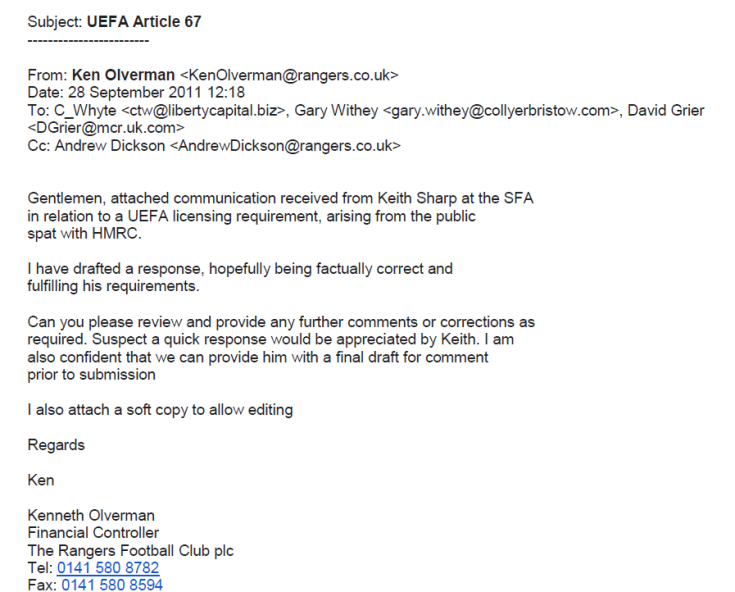
It would be very convenient to the SFA to hold its own enquiry into what actually happened, find that Oldco broke the rules – but only in the monitoring period where it couldn’t have affected the grant itself, issue a punishment or a statement that it is no longer possible to punish the Oldco and leave its own role in the affair outside the remit.
In fact I would go so far as to state that had Newco Rangers simply accepted the jurisdiction of the SFA to hear the case it would have been quietly buried just this way. The 5Way is fairly clear that Newco would escape sanction, but there is the possibility that the SFA would seek to punish Newco as the ‘operator of Rangers FC’, a term used in the five way agreement itself. This view results from the previously espoused logic that a member club can be a seperate thing from the company that runs its football team. Taking that to CAS would be a legal minefield. Rangers instead opted to get ahead of the issue by forcing the SFA’s hand – and kudos to them for it.
Instead the SFA is forced with a choice on how to proceed. It can challenge the claim of no jurisdiction at CAS. To do so it’d need to make the case that Rangers the club – being the same club as existed before the change in corporate ‘operator’ – is and has always been subject to its rules and regulations without interuption. If its forced to rely on the 5Way to make this case, it’d find its simply a contract between corporates that excludes liability and punishment other than in certain limited circumstances. It’d beg the question of “why in agreed to limit its own ability to deal with issues that are clearly in its remit to ensure are dealt with correctly and fairly”. I’m not sure that “we needed the money Rangers bring” would go down well.
In this scenario it is quite possible Rangers would actually dispute the ‘continuity of club’ argument and seek to focus on the legal nature of the arrangements under which the Newco became the club (within SFA Rules meaning) as part of a process of acquisition of Oldco’s assets. While UEFA insists a club must either be a corporate or have a binding contract with a corporate, it does not itself extend liability between two different corporates purporting to be the ‘operator’ (the word coming from the SFA lexicon) of the same ‘club’ at different times.
In this line of argument responsibility would lie with the corporate that operated the club at the time of the offence – predating Newco’s existence. None of that settles the “Same club/Different club” debate one way or the other. If the SFA win on jurisdiction it will be portrayed as clarity that Rangers are the same club, but frankly it could just as easily be confirmation that continuity of SFA Membership entails being treated as continuously the same club for the purposes of application of the rules. SFA Membership is not the same as being continuously the same club regardless of whether the SFA feel entitled to rule upon it for the purposes of association football in Scotland. This is because it only deals with what ‘club’ means for the purposes of the SFA rulebook. The SFA is subservient to UEFA on that matter and UEFA themselves have no clear rule on it.
On the other hand if Rangers win on jurisdiction, it would only serve to illustrate that CAS would focus on the legal/contractual nature of such disputes rather than a football associations interpretations of its own rulebook.
My hope is that the entire folly be dropped in favour of a full independent review of what went wrong on all sides. The problem with such a proposal is that it doesn’t settle the issue of liability, but that has to be secondary to getting to the root of the issue and ensuring it doesn’t happen again. If the SFA did indeed act with the rigour and independence we are entitled to expect then there would be little repercussions, but the truth would be available. If they failed to we are entitled to know who let down football and how it was permitted to happen. The Res 12 requisitioners will no doubt find any outcome that doesn’t see Rangers punished as unwelcome, but our key objective will always be ensuring governance standards within Scottish Football are above reproach. Allowing a rigged absolution at the hands of the SFA only compounds the problem.
The other acceptable alternative would be to turn the entire issue over to CAS if possible rather than just the jurisdiction question. For obvious reasons of scrutiny the SFA don’t want that either. If it could quietly go away its now their best outcome but it can’t while pressure is still being brought to bear. And hey, what do you know, we are back at how Lawwell was able to predict senior SFA appointments in exchange for helping a problem go away!
The Side Letter

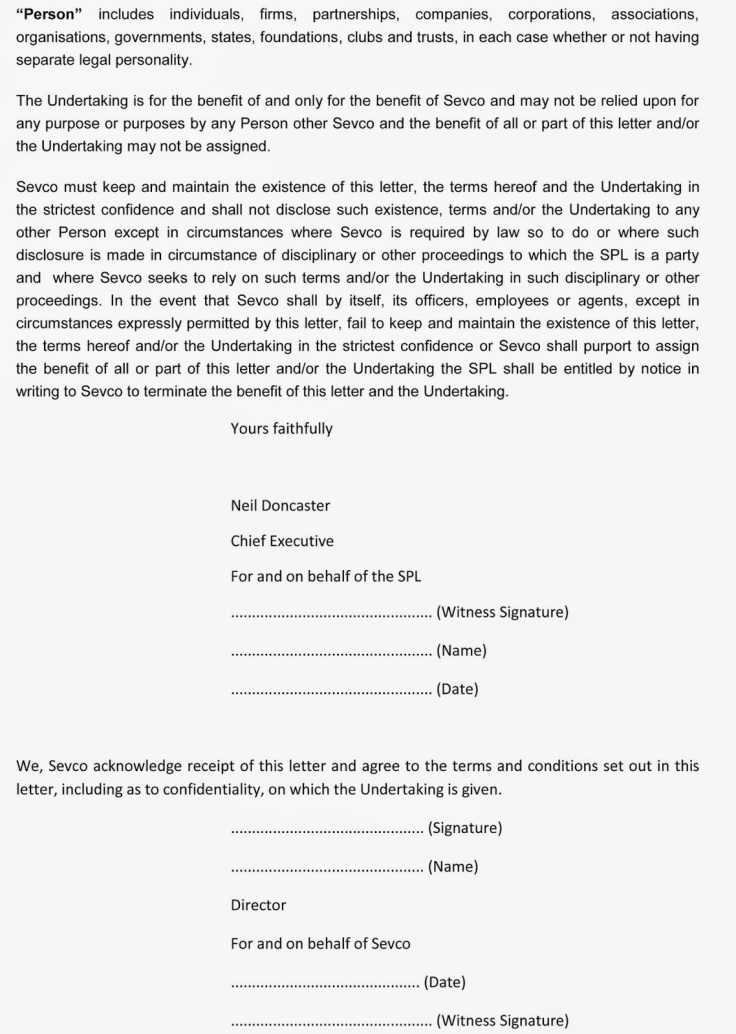
The 5Way
The whole document runs into 18 pages so only extracts included for brevity.

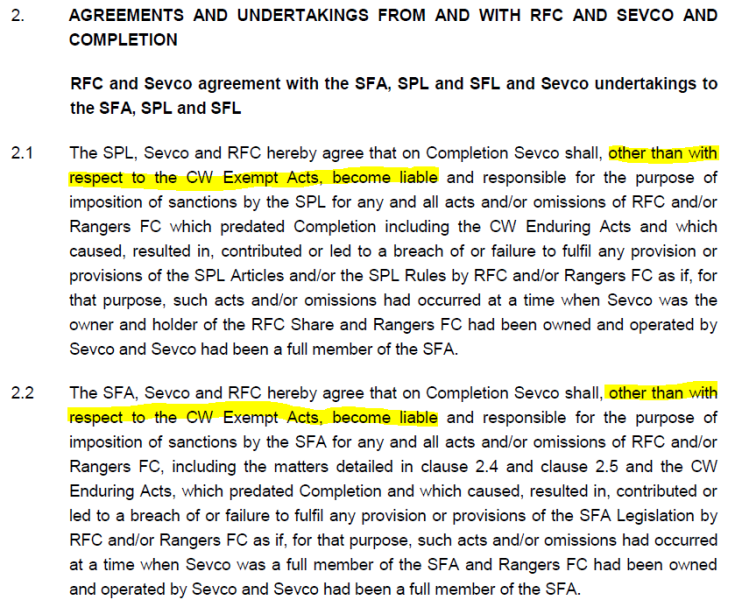
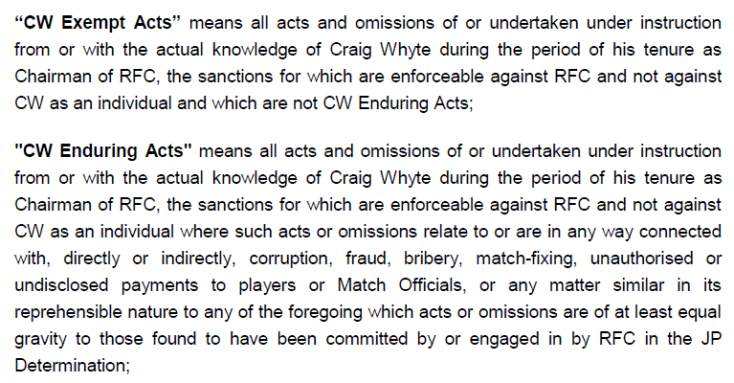
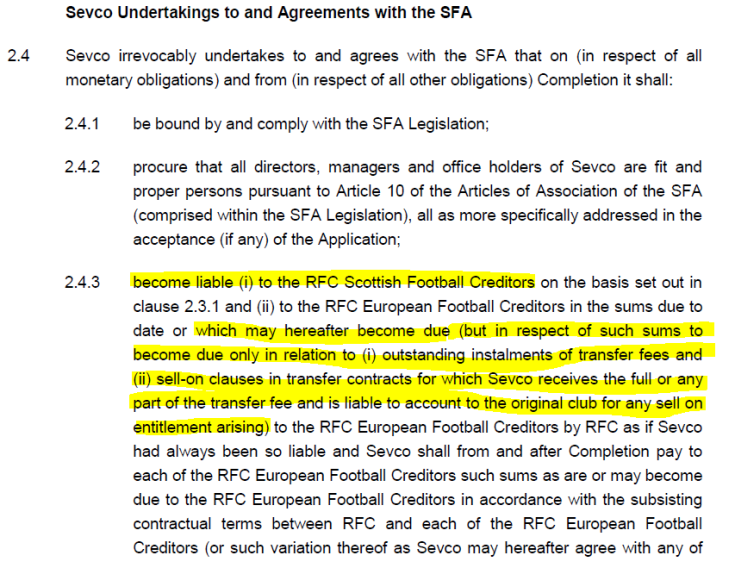





Leave a comment